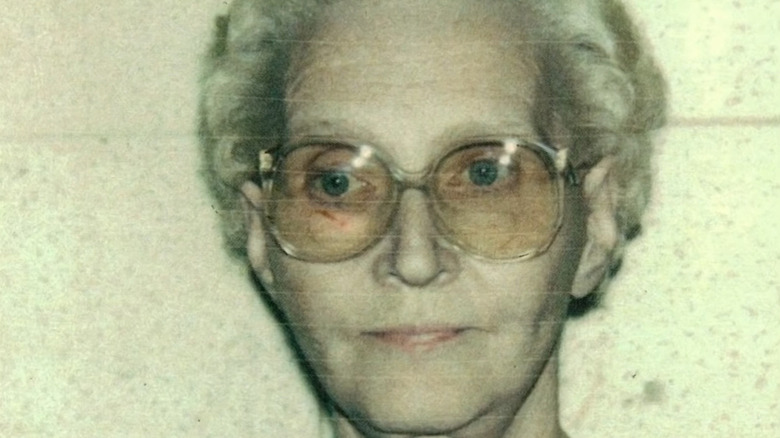What Happened To Dorothea Puente's Victim Betty Palmer?
Bad roommates are one of those things that, for a lot of people, are just a part of life. When you take on a roommate, whether a friend or a stranger, you do so with the expectation that the person will respect boundaries, contribute their portion of the rent and bills, and do their fair share of the household chores. And while roommate situations often go sour and lead to toxic relationships, in most cases they don't result in murder. However, the 2022 Netflix docuseries "Worst Roommate Ever" shone a light on several cases in which the roommate relationship ended in death.
And one of the most gruesome cases was that of Dorothea Puente, a Sacramento woman who was convicted of murdering three of her tenants, but who may have killed nine or more, according to The New York Post. And of those deaths, perhaps the most grisly was that of Betty Palmer.
Sacramento's forgotten people
Like any city, Sacramento had (and has) a homeless problem. Back in the 1980s, some of the city's homeless found refuge in the home of Dorothea Puente. At the time, according to the New York Post, Puente ran a boarding house, and would offer tenancy to people who battled homelessness as well as substance, or had criminal records, and thus couldn't find housing elsewhere.
As it turns out, Puente wasn't helping out those people out of the kindness of her heart. Instead, Puente would take the boarders in, then murder them and burying the bodies in her backyard, while continuing to cash their Social Security checks. What's more, because her victims were largely forgotten and living on the margins of society, it was unlikely that they would have friends or family members who asked questions. Long story short, their deaths were likely to go unnoticed. And they did go unnoticed, until a social worker noticed that she hadn't heard from one of her clients (who had moved in with Puente) in a long time. And when Puente's excuses — that the client had gone to visit family — didn't add up (the social worker knew that her client didn't speak to his family), the police got involved.
Digging up body after body
In November of 1988, according to the New York Post, a social worker became concerned and told police that her client, Alvaro Montoya, had disappeared. Another tenant, John Sharp, told the social worker that Puente had been making him dig holes. Armed with these allegations, police showed up at Puente's boarding house to ask questions. Puente kept up the act that Montoya was visiting family, but then they caught a break: Sharp slipped them a written message: "She's making me lie for her." Puente, who told neighbors and tenants that the smell coming from her back yard was sewage and rats, according to The Daily Mail, had told the police that they could search her yard, and had even provided a shovel.
Police would dig up other bodies — seven of them, according to Screen Rant — and Puente was eventually charged with their murders, plus two more.
Betty Palmer's story
Among those believed to have been murdered by Puente was Betty Palmer, who at the time of her death in 1986, would have been 77, according to Screen Rant. On August 19, she left for a doctor's appointment and was never heard from again.
According to Oxygen (which reports she was 79 not 77), her body was later dug up, albeit with her head, hands and feet missing. Puente was later found in possession of an I.D. belonging to Palmer; however, Puente had put her own photo in place of Palmer's, and was allegedly using it to cash Palmer's Social Security checks. According to a court transcript provided by Casetext, Puente may have taken as much as $7,000 in benefits belonging to her boarder. Puente also allegedly forged Palmer's signature on applications for other government benefits.
In 1993, Dorothea Puente was put on trial for nine murders. After months of testimony, and over 130 witnesses called (per the New York Post), Puente's case was sent to the jury. Deliberations lasted several days, but the panel was ultimately deadlocked, which the New York Post attributes to some jurors possibly having been duped by Puente's "sweet grandmother" schtick. After being instructed to continue deliberations, the jury handed down guilty verdicts for three murders: those of Dorothy Miller, Benjamin Fink, and Leona Carpenter, according to Oxygen. Puente was not convicted of Palmer's murder.
Puente was sent to prison and died a few years later of natural causes, at the age of 83. She maintained her innocence.



